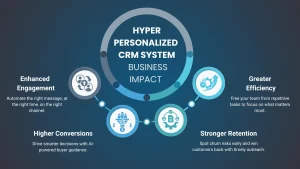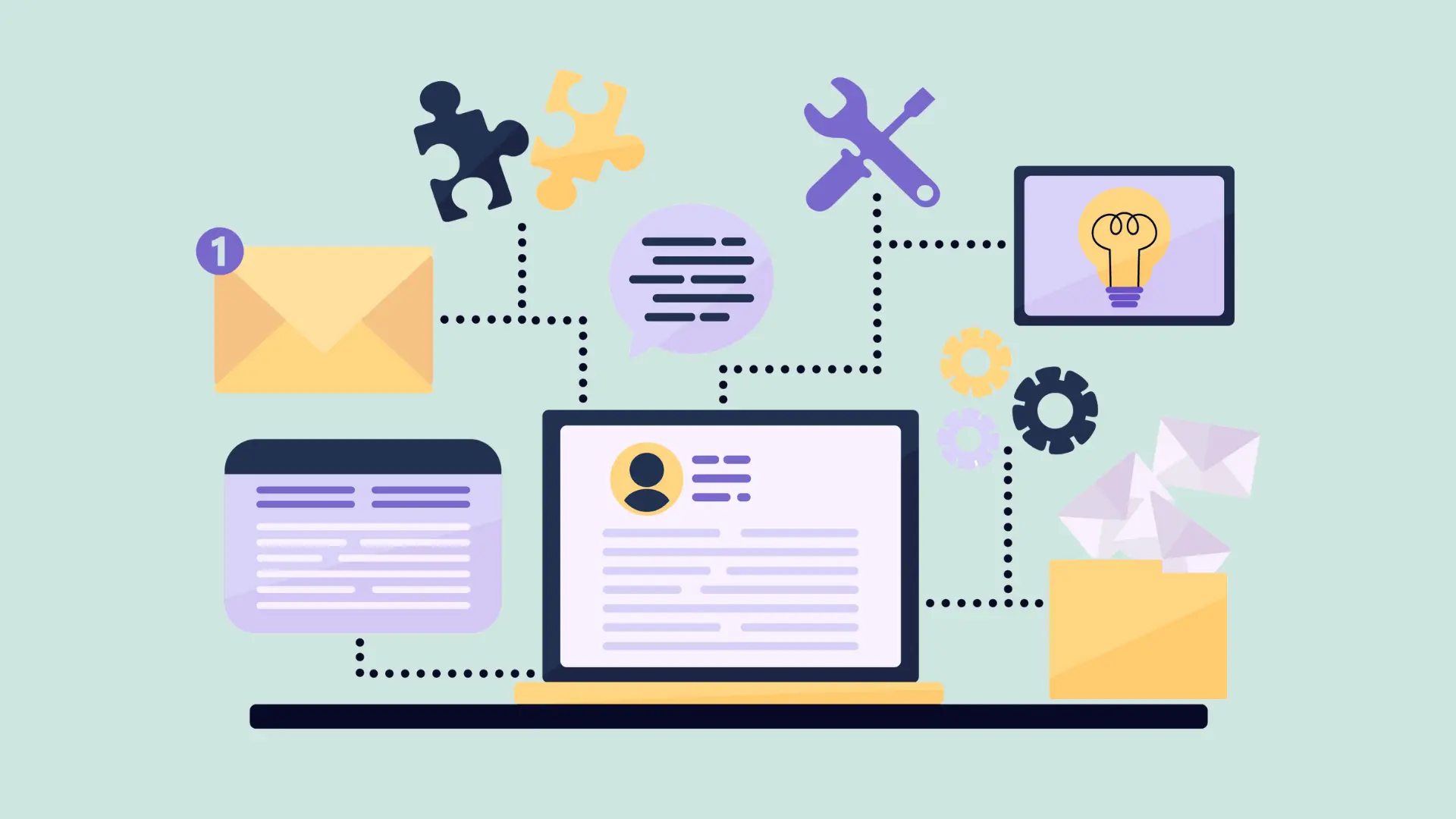Customer expectations have evolved. Individuals expect businesses to know their needs, respond in real time, and provide relevant experiences for each interaction. 71% of consumers expect personalized interactions from companies, and 76% feel frustrated when those expectations are not met. Legacy customer relationship management (CRM) systems are no longer enough to meet these expectations. Businesses today expect artificial intelligence (AI) to power hyper-personalization on CRM platforms.
This transformation enables businesses to customize each interaction with data intelligence, strengthening customer engagement and loyalty. In this article, we describe how AI-powered hyper-personalization is transforming CRM systems and enabling organizations to provide more personalized and responsive customer experiences.
Artificial intelligence is revolutionizing CRM systems, turning them from stagnant databases to dynamic engines of customer experience. Salesforce explores how AI-powered CRM systems are improving customer engagement, retention, and efficiency across industries.
What Is AI-Powered Hyper-Personalization in CRM?
Hyper-personalization goes beyond addressing a customer by name. It uses AI to study customer history, interests, and behavior to deliver real-time, context-aware content, offers, and services. AI-based CRM solutions process information in real time to make communications more personalized for each individual. AI applications in CRM also predict future customer behavior by analyzing past interactions.
With real-time interaction data and detailed customer profiles, companies can build automated processes that respond to distinct behaviors. Such personalization is scalable and effective across many touchpoints such as email, chat, web, and mobile.
How AI Amplifies CRM Capability?
Real-Time Data Analysis
AI collects information from multiple sources, website visits, email clicks, support chat, and purchase history, to study customer behavior in order to examine customer behavior. By examining this, CRM software is able to automatically update the profiles of users and customize efforts according to past activity.
Predictive Analytics
AI applications predict customer needs from preferences and behavior patterns. This allows CRMs to recommend the next best action, flagging customers who are not doing well and recommending personalized offers or messages against expected outcomes.
Automated Workflows
With AI, CRM systems can trigger specific actions based on customer behavior. For example, if a user abandons their cart, the system can trigger a specific reminder. If a customer reorders a product every 30 days, the system can schedule timely reorder reminders.
Intelligent Segmentation
Instead of fixed customer segments, AI supports dynamic segmentation according to interest, behavior, and engagement. This allows marketers to offer more relevant content, hence maximizing the potential for interaction and conversion.
Technologies Enabling AI-Powered Personalization in CRM
Machine Learning (ML)
Empowers CRMs to learn from customer data and regularly refine recommendations and targeting.
Natural Language Processing (NLP)
Enforces chatbots and sentiment analysis capabilities to understand and reply to customer queries in context.
Generative AI (e.g., GPT models)
Powers real-time, context-aware content creation such as personalized emails, chat responses, and product recommendations, by understanding customer history and intent.
Predictive Modeling
Forecasts customer behavior and suggests next-best actions, offers, or interventions based on historical patterns and real-time signals.
Hyper-Personalized CRM System Business Impact
Enhanced Customer Engagement
If the customers are reached out to by timely and useful messages, then they will have a higher possibility of engaging. AI personalization enables companies to send the most appropriate content to the most suited channel at the most appropriate moment.
Improved Conversion Rates
Personalization lowers the purchase process friction. AI-powered CRMs can aid users in making a purchase through product suggestions so that the process becomes less confusing and communication easier.
Improved Retention and Loyalty
AI assists businesses in realizing when a client is likely to opt out. With such information, they are able to act fast by providing accurate messaging in an attempt to re-engage clients and maintain long-term interactions.
Improved Operational Effectiveness
AI-powered automation ends the mundane task of data inputting and mass outreach. Strategy development as well as rapport building can be done by teams, while iterative work en masse can be handled by AI.
Challenges to Overcome
AI-powered hyper-personalization offers many benefits for CRM systems, like making customer interactions more tailored and improving overall efficiency. However, it also presents specific challenges. These challenges are not limited to technical issues; they also involve important factors such as trust between the company and its customers, being open and honest about how data is used, ensuring ethical practices, and considering how customers feel about personalization. For personalization to work well, last a long time, and truly benefit both the company and its customers, organizations need to focus on these areas with clear purpose and care.
Data Privacy and Compliance
Hyper-personalization is data-driven. Companies have to be compliant with privacy legislations such as GDPR and CCPA. The worth of clear management of data and obtaining clear approval from consumers lies in it. and CCPA. The worth of clear management of data and obtaining clear approval from consumers lies in it.
Steer Clear of Bias in AI Models
Artificial intelligence models may inadvertently possess biases within the data fed into them. Companies have to review algorithms regularly and employ diverse datasets to provide equal and inclusive personalization models.
Managing Customer Expectations
Too personal can be invasive. Companies must strike the right balance of value without flooding users with relevant messages.
Being Transparent with Personalization
Customers must know why and how they are being spoken to with particular messages or recommendations. Feedback about how AI is employed can generate confidence and trust.
Best Practices for Implementation
Use First-Party Data
Leverage direct engagement to construct customer profiles instead of third-party information.
Integrate AI Tools with CRM
Interconnect AI-powered analytics, automation, and messaging tools with CRM systems for an integrated view of the customer journey.
Test and Optimize Regularly
Apply A/B testing to test and compare multiple personalization approaches and optimize techniques based on their performance.
Make Ethical Use of AI
Implement governance of data use and AI to avoid misuse and achieve legal and ethical standards.
Future Outlook – AI-Powered Hyper-Personalization in CRM Systems
As the capabilities of AI continue to improve, CRM systems will be more intuitive, proactive, and responsive. We can look forward to more voice-assisted, emotion-aware interactions and real-time personalization on all channels. The future of CRM will be from record-keeping to customer enablement, and AI will be the catalyst for delivering personalized experiences.
Beyond Automation – Creating Meaningful Moments
Though AI in CRM often gets attributed to automation and efficiency, its true strength lies in its ability to create meaningful, human-like experiences. AI-driven personalization isn’t about sending more messages; it’s about sending the right message at the right time, in a way that resonates. Whether it is a customized product offer based on a record of past purchase history or an opportunistic we miss you welcome where there is a gap in activity, these types of small touches can be very effective at securing long-term loyalty.
But personalization must be more than nametags and birthday greetings. It must answer a customer’s behavior, mood, and interests across touchpoints. When AI-driven insights are used to create relevant interactions, customers don’t feel targeted; they feel understood. And that’s the foundation of an actual relationship.
Empathy in Every Click – The Heart of Humanized Personalization
At the heart of hyper-personalization is something deeply human – empathy. The ability to read patterns and predict behavior is made possible by AI, but it’s the application of that information that will make the experience feel beneficial or invasive. Customers don’t want to feel watched; they want to feel appreciated.
Empathic AI is to be boundary-respecting, respectful of choice, and transparent around data gathering and usage. Permitting customers access to an intelligible and understandable dashboard with which to manage communication preferences will go a very long way to gaining trust. It turns personalization into a conversation and not a broadcast.
When empathy is embedded in the design of AI-powered CRM systems, personalization does not taste like automation and instead feels like considerate service, like a barista remembering your usual order, not a machine just following a script.
AI as a Teammate – Enabling Humans Behind the Scenes
AI in CRM isn’t limited to customer-facing activity; it’s transforming the functioning of internal teams, too. No more waiting for instinct or ancient spreadsheets from sales, marketing, and support teams. With AI, they can work harder, not more.
Consider a support rep who knows, before answering a question, that the customer in the previous month experienced a late shipment and merely reviewed the return policy. Instead of asking redundant questions, the rep can dive directly into a helpful response. That’s not just effective, it’s personal, and it shows the customer that the company is listening.
AI doesn’t replace people. It helps them. It does tedious work like data entry or lead scoring, so employees can focus on high-impact activities – relationship-building, creative problem-solving, and delivering great service. This balance between technology and talent creates a more collaborative and productive workplace.
Conclusion
AI-powered hyper-personalization is no longer a choice for customer-centric businesses. AI-powered CRM solutions offer a scalable means to enrich customer relationships, increase engagement, and improve business performance.
Businesses that move now can create a platform for sustainable growth and differentiation in a competitive market. With vision, ethical data practices, and the right technology, businesses can create meaningful, personalized experiences that customers appreciate.
Frequently Asked Questions
What is AI-powered hyper-personalization in CRM?
AI-powered hyper-personalization in CRM refers to the use of artificial intelligence, machine learning, and real-time data analytics to deliver highly tailored customer experiences at every touchpoint, far beyond traditional personalization methods.
What are the main benefits of hyper-personalization for businesses?
Key benefits include improved conversion rates, higher ROI, stronger customer loyalty, increased engagement, and a seamless customer experience.
What is the difference between personalization and hyper-personalization?
Personalization uses basic customer data (like name or purchase history) for tailored experiences, while hyper-personalization leverages AI and real-time data to deliver context-aware, highly individualized interactions across every touchpoint.
How is AI used in personalization?
AI analyzes customer data and behavior in real time to deliver tailored recommendations, messages, and offers across channels. It powers features like predictive analytics, automated workflows, chatbots, and dynamic segmentation, enabling highly relevant, timely, and individualized experiences.
How to implement hyper-personalization?
Collect first-party data, integrate AI tools with your CRM, use real-time analytics for dynamic content and offers, automate workflows, test and optimize regularly, and ensure ethical, transparent data use for customer trust.





